-
Why Chemical Drain Cleaning Is Bad for Your Plumbing
Pros and Cons of Chemical Drain Cleaning
Plumbing clogs are nobody’s favourite, and when you find you have a clog, your first instinct is probably to get rid of it as quickly as possible. In your quest for a quick solution, you may reach for a liquid drain cleaner, but should you? Sure, it’s a quick and easy solution, because all you have to do is pour it into your drain and wait for the clog to dissolve. Drain cleaners are also inexpensive when compared to a plumber, and they do a really good job on removing food or hair buildup in your drains. The big question is, can drain cleaner damage pipes? Unfortunately, yes, and it can cause harm in other ways, too. This is one of those situations in which the cons outweigh the pros, so keep reading to learn more.
What to Know About Drain Cleaners
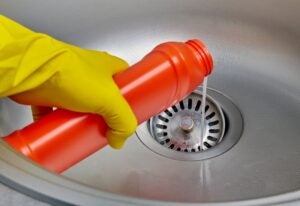 The first important thing to understand is the mechanisms behind drain cleaners. Chemical drain cleaners work, as you might expect, by causing a chemical reaction between the ingredients in the cleaner and whatever is causing your clog. If the reaction works as intended, the clog will either dissolve or move along. However, chemical reactions can be unpredictable and dangerous, and the chemicals used in the cleaners can linger in your kitchen or bathroom plumbing. There are a few different types of chemical drain cleaners.
The first important thing to understand is the mechanisms behind drain cleaners. Chemical drain cleaners work, as you might expect, by causing a chemical reaction between the ingredients in the cleaner and whatever is causing your clog. If the reaction works as intended, the clog will either dissolve or move along. However, chemical reactions can be unpredictable and dangerous, and the chemicals used in the cleaners can linger in your kitchen or bathroom plumbing. There are a few different types of chemical drain cleaners.- Acidic cleaners break down clogs with acid. They are typically made of sulfuric or muriatic acid and may need to be used several times to get rid of the clog. These drain cleaners are most often used to remove clogs caused by hair.
- Oxidizing cleaners are not quite as harsh as acidic cleaners. They contain ingredients like bleach, peroxide, or nitrates, and they can require a significant amount of time to work. They are often not very effective, and work best when used on clogs made of something that’s easy to break down, like food.
- Caustic cleaners are similar to acidic cleaners in how they work. Typically made of lye or potash, they have a much higher pH than acidic cleaners, and are best suited for removing grease clogs.
Why Use Chemical Drain Cleaners?
What are chemical drain cleaners used for? These products are appealing because they’re easy to use. Because they are heavier than water, they can easily sink through standing water in your sink or toilet plumbing and get to the clog, in order to break it down. The ingredients in drain cleaners are meant to decompose organic materials like hair and grease, but they can also cause problems not only for your pipes, but also for your health.
Chemicals Drain Cleaners are Bad for Pipes and People
How is drain cleaner bad for pipes? First, the combinations of chemicals used in the cleaners can burn through clogs, but the chemical reactions they cause can create heat and gas in your pipes. Especially if you have old plumbing, this can destroy your pipes. Then, too, if the problem is something liquid drain cleaner cannot handle, like tree roots in the plumbing, then all those chemicals are just left sitting in your pipes, eating away at them. And even if the pipes are not damaged immediately when you use drain cleaners, the cleaners leave residue that can cause future chemical reactions.
The chemicals are dangerous for people, too. They can splash on you, burning your skin and injuring your eyes, and in some cases, air pockets can be created that cause blow back from the pipes, resulting in injury to the person using the drain cleaner. What’s more, these products are not environmentally friendly. When they get through little cracks in the waste line, they can leach into the ground and harm organisms and plants there, even damaging tree roots. And when you throw away the bottle, it is likely to end up in a landfill, further damaging the internet.
Try Natural Solutions
If you have a clog and you are considering drain cleaner, try some simple, natural solutions first, like using a plunger, or a plumbing snake or auger. You can also make drain cleaners yourself, with materials you probably already have around your kitchen. Try a baking soda and vinegar rinse, for instance, giving it time to work and then rinsing it with boiling water.
Call in the Professionals
For over half a century, Eagerton Plumbing has been a leading provider of residential and commercial plumbing services in Jacksonville, Florida and the surrounding areas. Customers in Duval, Clay, Nassau, and St. Johns counties know they can rely on us not only for comprehensive plumbing services, but also for slab leak detection and repair, kitchen and bathroom remodeling, and more. No job is too big or too small, and we are here for our customers 24 hours a day, 7 days a week, offering exceptional customer service and reliable repair services, backed by service guarantees. All of our experienced plumbers are licensed, insured, and background checked, and we are committed to getting the job done right the first time, customizing an affordable solution to meet your needs and solve your plumbing problems. When you need a reliable plumber, any time of day or night, call 904.638.7979 or contact us through our website.
-
10 Things You Should Never Put Down Your Drain
Ten Things You Should Never Put Down Your Drain
Every family has daily routines and habits. You make your morning coffee, cook pasta for dinner once a week, and perhaps enjoy a fried breakfast on the weekend. But have you ever considered how these seemingly harmless habits can disrupt your home’s plumbing system? If you’re not cautious about what you put down the drain, you could end up with some serious clogs. Protect your plumbing system by understanding what should never go down your drain.
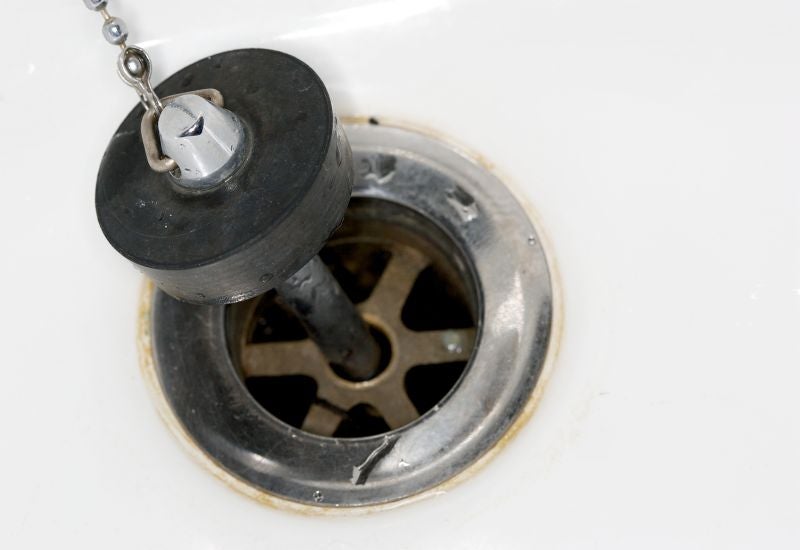
How to Know If Your Drain is Clogged
Spotting a clogged sink or shower drain is straightforward. The first sign is water draining more slowly than usual. If you don’t address this issue promptly, the water may stop draining altogether, signaling a complete blockage. Slow drains typically don’t arise overnight. They develop after weeks or months of foreign objects going down the drain, so there’s usually plenty of time to act before the clog becomes severe.
Things to Not Dispose Down Your Drain
It’s a common misconception that if your sink has a garbage disposal, all foods are fair game. But this is simply not the case. Certain items can harm your plumbing system whether you have a garbage disposal or not. Here’s what you should never dispose of down the kitchen or bathroom sink:
- Used cooking grease: This is perhaps the most notorious drain-clogging substance. Grease is liquid when hot, but as it cools, it solidifies and sticks to the inside of your pipes. This sticky residue then attracts other items, like eggshell bits or food particles, creating thick, goopy blockages. Even if the grease manages to remain a liquid until it reaches the city sewer line, it causes problems there, resulting in millions of dollars and countless hours of repair work.
- Coffee grounds: Many people mistakenly believe that coffee grounds won’t pose a problem if rinsed down the sink. After all, the particles are tiny and harmless, right? Think again. Coffee grounds are a leading cause of clogged kitchen drains because they can easily accumulate and cause blockages.
- Pasta: Cooked noodles might seem like a soft, easy-to-break-down food, but the starchy consistency is problematic for drains. Pasta containing semolina continues expanding and softening once it’s down the sink, resulting in a sticky substance that can form blockages. While organic pasta without semolina might be less problematic, it’s always better to avoid the risk.
- Rice: Rinsing large amounts of rice down the drain might seem like no big deal, but like pasta, rice expands when it absorbs water. Over time, these grains can grow and clump together, leading to potential blockages that may be difficult to dislodge.
- Eggshells: Have you heard that eggshells sharpen garbage disposal blades, meaning you should intentionally put them down the drain? Don’t fall for this rumor! Eggshells present a unique problem because, once ground up, they turn into smaller bits, which combine with grease and other residue to form a sandy paste. This paste can easily stick to the sides of pipes, creating obstructions over time.
- Flour: A staple in most kitchens for baking cookies and thickening gravy, flour can be deceivingly harmful when mixed with water. After all, flour is a thickening agent. When it combines with water in the pipes, it coats the insides, slowly building up and catching other waste items until severe blockages occur.
- Fruit pits: A garbage disposal might seem powerful, but it’s not robust enough to effectively pulverize fruit pits. Not only can this jam the disposal or damage the blades, but large pit fragments can become lodged in the drain.
- Bones: Small chicken bone fragments are easy to miss when rinsing your plate, but do your best to scrape them into the trash instead. Standard garbage disposals aren’t equipped to break these down, so over time, bits and pieces can accumulate in the drain and cause blockages.
- Medication: Disposing of unused or expired medicine down the drain might not directly clog your pipes, but they can enter the water supply and cause broader environmental and health implications. Recent studies from the US Geological Survey have found traces of pharmaceuticals in the drinking water supply, underscoring the importance of proper disposal.
- Household fluids: Similar to medication, household fluids like paint thinner, bleach, coolant, and motor oil don’t necessarily cause clogs, but they pose a different kind of threat. Many regions have strict regulations on household fluid disposal to prevent water contamination. Follow these guidelines to avoid contributing to environmental and health concerns.
Contact Eagerton Plumbing
With 70 years of experience, Eagerton Plumbing is a trustworthy place to turn for drain cleaning services in Jacksonville, Orange Park, and nearby areas. As a Florida State Certified company, we prioritize affordable and tailored solutions that align with your needs. Our commitment is further showcased through our 24/7 emergency plumbing services. Don’t let a clogged drain disrupt your peace of mind. Contact us at (904) 388-0761 to schedule the plumbing services you need.
-
Types of Backflow Preventers
The one-way flow of water into your home ensures you receive clean water for drinking, cooking, and bathing. However, sometimes the flow reverses, allowing contaminated water to mix with your clean supply. This plumbing anomaly is called backflow, and it occurs when water reverses its course, potentially introducing contaminants into the potable water system. The primary causes of backflow are backsiphonage and backpressure.
Backsiphonage occurs from a drop in water pressure, such as during a water main break or when a fire hydrant gets hit. This pressure drop can pull contaminants from areas like gardens or commercial locations into the drinking water.
Backpressure results from increased downstream water pressure. This can happen if an irrigation system gets blocked, causing contaminated water to push back into the clean supply.
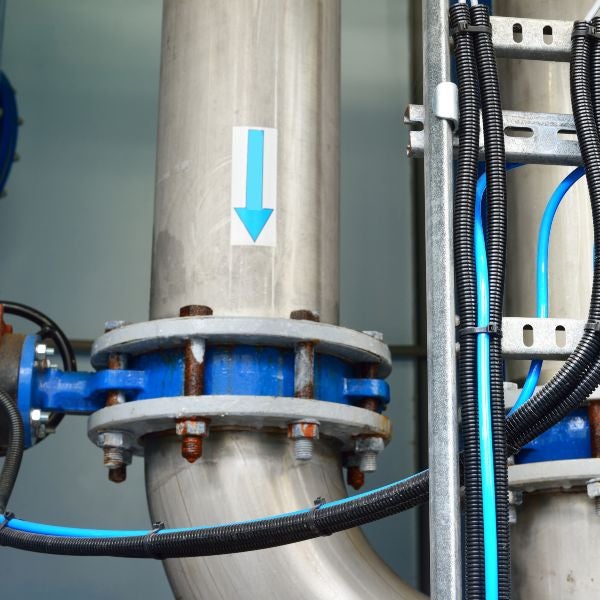
What is Backflow Testing?
To stop backsiphonage and backpressure, you need backflow preventers, essential devices that maintain the integrity of your household’s water supply. Backflow prevention involves installing the right devices and ensuring they work effectively. That’s where backflow preventer testing comes in.
Evaluating the backflow prevention devices within your plumbing system allows certified plumbers to determine if these barriers are working optimally to protect your water. This regular assessment involves checking valves for leakage or malfunctions. If any issues arise, a quick, efficient repair ensures your water remains uncontaminated.
Importance of Backflow Testing
The consequences of backflow can be dire. Here’s what backflow testing aims to prevent:
- Disease: Backflow often involves sewage backups, introducing harmful bacteria to your water supply. This can lead to dysentery, typhoid, and salmonella outbreaks.
- Heavy metal contamination: Public spaces can experience heavy metal contamination due to backflow. Examples include copper poisoning from soda dispensers or other harmful metals leaching into the water system.
- Chemical contamination: Insecticides, herbicides, and other chemical waste products can enter the plumbing system through backflow, posing significant health hazards if consumed.
Varieties of Backflow Preventers
Different situations call for different types of backflow prevention devices. Some common ones include:
- Air gap (AG): This method separates potable and non-potable systems with a physical air space. The simplest example is the space between a faucet and a sink. Air gaps ensure contaminated water doesn’t mix with the clean water supply.
- Atmospheric vacuum breaker assembly (AVB): This device contains an air inlet valve and a check seat. When water flows, the air inlet valve closes. In the absence of water flow, the valve drops against the check seat, preventing back siphonage and allowing air intake.
- Pressure vacuum breaker assembly (PVB): Though similar to AVB, this device contains a spring-loaded air inlet valve and check valve, along with two shut-offs and test ports. It operates by ensuring the check valve remains open during water flow while the air inlet valve remains shut. When water stops, the roles reverse. PVB assemblies protect against back siphonage only—they are still vulnerable to backpressure.
- Spill-resistant vacuum breaker assembly (SVBs): While standard PVBs can occasionally leak water, SVBs offer a more secure solution, especially for indoor plumbing. Designed similarly to PVBs, SVBs incorporate extra diaphragm seals, ensuring water doesn’t escape from the air inlet during pressurization. Like PVBs, they safeguard against back siphonage but not backpressure.
- Double check valve assembly (DCVA): This device houses two spring-loaded check valves, two shut-off valves, and four test cocks. Dual check valves ensure a built-in backup if one fails.
- Reduced pressure principle backflow assembly (RP): Also known as a reduced pressure zone assembly, this system contains two spring-loaded check valves with a differential relief valve between them, two shut-off valves, and four test cocks. The relief valve maintains a reduced pressure zone and air gap between the check valves.
How to Choose the Right Type of Backflow Preventer
If you’re considering backflow prevention for your home or business, remember the following:
- Range of coverage: PVBs and similar assemblies aren’t equipped to handle backpressure or perform optimally in high-hazard situations, but they’re often adequate for household settings. In contrast, a higher level of protection is required for environments like hospitals and factories.
- Cost considerations: Prices for backflow preventers vary widely based on complexity, size, and the specific type of device. When comparing assemblies, the PVB is one of the more budget-friendly options. In contrast, the high-performing RP comes with a heftier price tag.
- Installation and maintenance complexity: Simple options like the PVB or SVB offer straightforward installation and maintenance procedures. On the other hand, the RP demands a more intricate installation process and advanced maintenance due to its comprehensive features. The DCVA’s installation and upkeep requirements fall between those of the PVB and RP.
Why Choose Us?
With 70 years of experience as a Florida State Certified company, Eagerton Plumbing proudly offers affordable, customized solutions to fit your unique needs. And when emergencies strike, we’re here for you 24 hours a day. To schedule backflow preventer testing or other plumbing services in Jacksonville, Orange Park, and the surrounding areas, please contact us at (904) 388-0761.
-
Essential Drain Cleaning Tools
Essential Drain Cleaning Tools
A well-maintained plumbing system is crucial for any home or business. Blocked drains are a huge inconvenience, and the key to getting things flowing again is to have the right drain cleaning tools on hand. Knowing which ones to use for different situations can save you time and resources. Whether you’re a DIY enthusiast or a professional plumber, this guide explains what essential drain pipe cleaner tools should be in your arsenal.
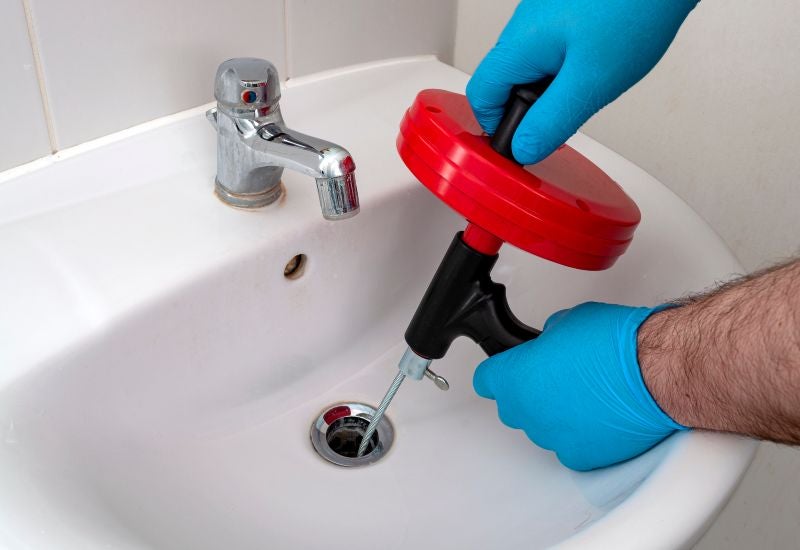
Piping Tools
Having the proper tools makes all the difference when manipulating, adjusting, and repairing pipes. Here’s what you might need when working on the kitchen or bathroom sink drain:
- Pipe cutters: A clean cut is crucial when altering or replacing a pipe. Pipe cutters slice through the material efficiently, ensuring a neat cut without fraying or damaging the pipe.
- Pliers: These versatile tools are essential for gripping, bending, and adjusting pipes. Pliers are especially handy when working in tight spaces or with small fittings.
- Metal files: Once a pipe has been cut, its edges may be sharp or uneven. Metal files are used to smooth these edges, ensuring the pipes fit together perfectly and preventing potential leaks.
- Tubing cutters: These are similar to pipe cutters but are designed specifically for tubes or smaller-diameter pipes. They provide an equally precise cut, ensuring your plumbing system’s integrity is not compromised.
- Pipe wrenches: These are vital for tasks that require tightening or loosening threaded pipes and fittings. With its adjustable design, a pipe wrench can grip various pipe sizes effectively.
Drain Cleaning Chemicals
Drain cleaning chemicals, usually available in liquid or granular form, offer a quick but temporary solution for minor blockages. Just a word of caution—the corrosive nature of drain cleaning chemicals means they can gradually erode your pipes if used excessively. Therefore, reserve them for infrequent use. Opting for natural or enzyme-based cleaners is a safer and more environmentally friendly alternative.
Plunger
The plunger’s design may be simple, but it’s a go-to drain pipe cleaning tool for good reason. Most people think of using a plunger on a toilet, but the classic cup plunger is well-suited for sinks and bathtubs. On the other hand, the flange design, with the extra flap below the main cup, is ideal for the unique design of a toilet drain pipe.
The plunger creates a vacuum when pressed around the drain. The subsequent pressure caused when you push it up and down dislodges blockages effectively, making it an essential tool for every household.
Drain Auger or Snake
A drain auger, often called a drain snake, is a standout tool that both DIY enthusiasts and professional plumbers use. It’s a long, flexible tool resembling a coiled snake that can reach deep into a clogged drain. For blockages that are too stubborn for chemicals or plungers, the mechanical action of a drain snake is often enough to break through the obstruction.
Drain snakes are flexible, allowing them to navigate the twists and turns of a plumbing system and reach obstructions located relatively far from the drain opening. Available in different sizes, lengths, and manual/motorized versions, you can find an auger suited for every type of blockage and drain.
Wire Brushes
Wire brushes feature stiff bristles mounted to a flexible wire handle, allowing them to effectively scrub the inner surfaces of pipes and ensure a thorough clean. Just like other sink drain cleaning tools, wire brushes come in different shapes and sizes designed for kitchen and bathroom sinks and other drains.
Hydro-Jetting Equipment
Hydro-jetting is a modern solution to the age-old problem of clogged drains. A hydro-jet uses high-pressure water to blast away obstructions and accumulated grime. Beyond just clearing blockages, hydro-jetting can restore pipes to their near-original condition, removing layers of mineral deposits and other buildup. Unlike chemical cleaners, hydro-jetting is environmentally friendly, using only water to achieve its results.
Video Inspection Equipment
Video inspection tools have revolutionized drain maintenance. A small camera affixed to a long, flexible cable is inserted down the drain, offering a real-time visual of what’s happening inside the pipes. This non-invasive diagnostic method enables plumbers to precisely identify blockages, cracks, or other structural issues without guesswork or unnecessary excavation. With the ability to pinpoint the problem’s exact location and nature, the plumber can perform the repair with confidence, reducing labor costs and ensuring better results.
Contact Eagerton Plumbing
With 70 years of experience as a Florida State Certified plumber, Eagerton Plumbing has all the necessary drain sewer cleaning tools to get your pipes flowing again. We pride ourselves on offering affordable, customizable solutions tailored to your needs and lifestyle. If you experience unexpected plumbing emergencies, we’re available 24/7 to provide prompt assistance. The next time drain issues threaten to ruin your day, please contact us at (904) 388-0761 to request drain cleaning in Jacksonville, Orange Park, and the surrounding areas.
-
Professional Drain Cleaning Services in Jacksonville, FL
Drain Cleaning Services in Jacksonville for All Seasons
Commercial drain cleaning is an essential part of the overall maintenance of your building. Without it, you run the risk of burst pipes, backed-up sewer lines, clogged drains, leaks, and more. All of these problems become more likely in the winter. That’s why we offer professional plumbing drain cleaning and sewer cleaning here at Eagerton Plumbing. We use the latest tools and technology to clean your drains and prepare them for winter safely. So ask yourself, when was the last time you had your drains professionally cleaned? If it’s been too long, be sure to give us a call.
Winter Weather Challenges for Drain Cleaning
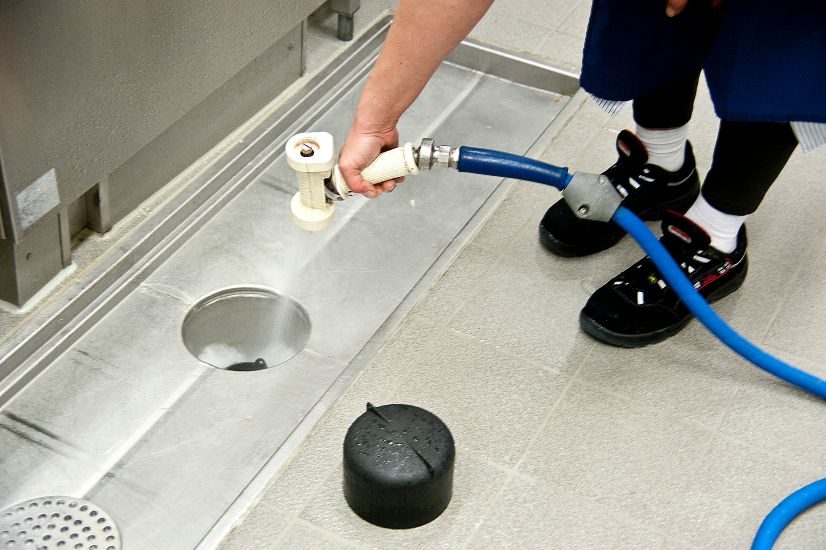
The colder temperatures present different problems from the ones your plumbing systems face when it’s warm. What may be fine to do in the summer may lead to clogs and leaks in the winter. Take a look at the following list of common winter commercial plumbing problems:
- Frozen Water – Sometimes, the water in your pipes can freeze when the temperatures are low enough. Frozen water can lead to clogs in the line. Pipes can also burst outright and cause costly leaks.
- Overflowing Lines – When there is an increase in precipitation (as there often is in Jacksonville winters), your commercial drain lines might overflow. This is an even bigger risk when you haven’t had your drains cleared for many months.
- FOGs – FOG stands for Fats, Oils, and Grease. FOGs congeal much faster in the winter. So if you have many of these substances in your drains and pipes, they can congeal and cause clogs.
The best way to avoid the above problems is to keep up with regular maintenance and drain cleaning. Regular maintenance may seem like a hassle but it can save you money. A commercial drainage leak can cost thousands of dollars to repair. But if you get your drains cleaned regularly, you can avoid more expensive damage. Hiring a professional drain cleaning company will also ensure that your plumbing lines are fully functional – something you can’t leave to chance as a business owner. For more information on our commercial drain cleaning services in Jacksonville, FL, call us.
Health and Safety Concerns Regarding Clogged Sewer Lines
Did you know that clogged sewer lines can lead to backups that, in turn, can lead to infections? Sewage water contains contaminants that are harmful to humans and pets. Leaking water from clogged drains can also cause mold, releasing spores into indoor air. These spores can cause allergic reactions and even respiratory issues.
When you fail to keep your drains clear, they can back up and leak into your interior spaces, hurting the health of your patrons and employees. Besides the serious health concerns, clogged drains can cause foul odors and generally unsanitary conditions. While clogged drains have serious health risks, you can prevent them with regular cleanings. Besides, many businesses are legally required to ensure that their septic, sewer, and drain lines are regularly cleaned.
Eagerton Plumbing is committed to helping business owners in Jacksonville, FL keep their buildings safe and healthy. We offer complete commercial drain cleaning, so call us today.
Get Affordable Drain Cleaning Today
Our team at Eagerton Plumbing does regular drain cleanings to negate the need for pricey work like pipe repair, mold remediation, and leak cleanup. We offer affordable rates to save you even more money. Ensure your pipes and drains are safe and functional by calling or filling out our contact form.
RECENT POSTS
categories
- Uncategorized
- Water Heater Installation
- Tankless Water Heater
- Plumbing Services
- Bathroom Remodeling
- Hot Water Heater
- Plumber in Jacksonville
- Water Heater Repair
- Eagerton Plumbing
- Eco-Friendly Plumbing Repair
- Water Damage
- Plumbing Leak
- Sewer Line Repair
- Infographic
- Clogged Drains
- Kitchen and Bathroom Remodel
- Bathroom Plumbing
- Residential Plumbing Services
- Garbage Disposal
- Toilet Repair
- Water Heater Replacement
- Water Conservation
- Emergency Plumbing
- Commercial Plumbing Services
- Kitchen Design Inspiration
- Kitchen Remodel
- low-flow toilets
- Leaky Faucet
- Conserve Water
- Drain Pipes
- Kitchen Sinks
- Vessel Sink
- Plumbing Problems
- Water Leak
- Commercial Remodeling Contractors
- Drain Cleaning Services
